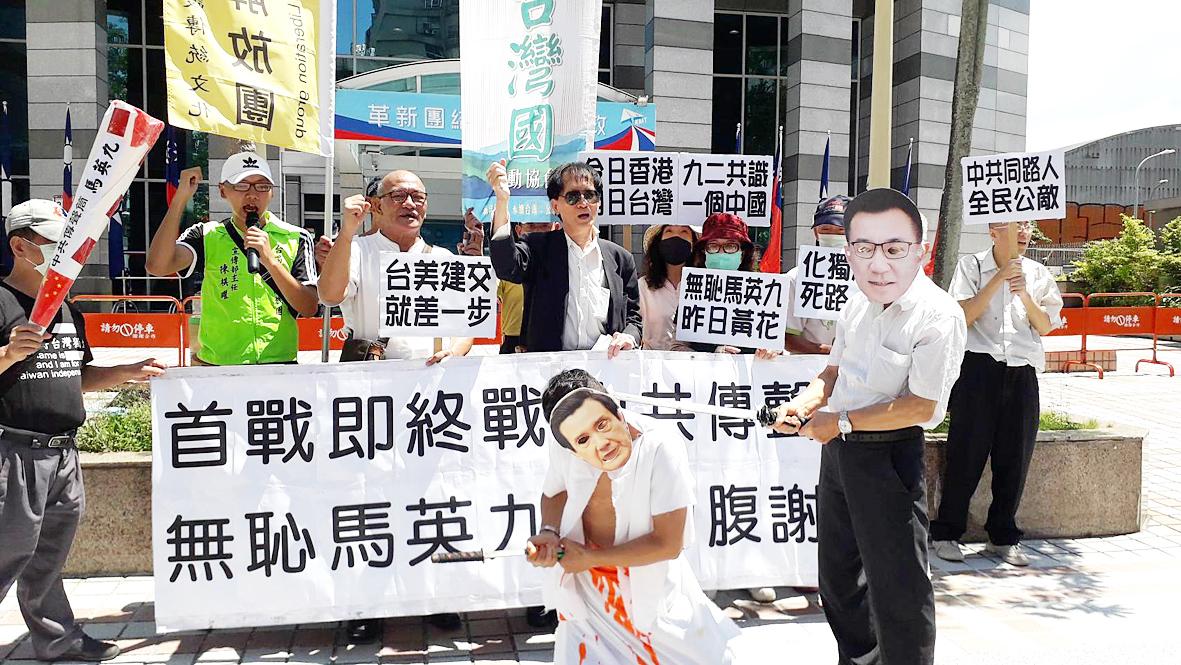Taiwanese-independence advocates yesterday accused former president Ma Ying-jeou (馬英九) of breaking national security laws and called on the judiciary to investigate after his statement that “China will wage a battle, which will be quick and will be the last battle for Taiwan.”
Ma showed his true colors “as a mouthpiece of the Chinese Communist Party” in his speech on Monday when he said the “first battle will be the last,” Taiwan Republic Office (台灣國辦公室) director Chilly Chen (陳峻涵) said.
“Ma is threatening Taiwanese by claiming that Beijing will launch a quick invasion of Taiwan, but that the US military will have no time and no chance to come to Taiwan’s aid,” Chen said.

Photo: Jason Pan, Taipei Times
Chen and other protesters called Ma “a bootlicker” of Chinese President Xi Jinping (習近平) and a colluder with an enemy state, seeking to sell out Taiwan.
At the protest in front of Chinese Nationalist Party’s (KMT) headquarters in Taipei, Taiwan Republic Office members performed a skit in which Chen, wearing a Ma mask, acted as if he were committing hara-kiri.
“We are asking Ma to perform hara-kiri as a public apology to our citizens for selling out Taiwan... We cannot accept Ma’s talk of capitulation — and that coming from a former president, who is now a propagandist for China and coerces the Taiwanese to surrender to China without a fight,” Chen said.
Members from the Taiwan Independence Party (建國黨), the Nation Building Forum (建國廣場) and a youth group advocating Taiwan’s liberation from colonial powers also joined the protest.
The demonstrators called on KMT Chairman Johnny Chiang (江啟臣) to revoke Ma’s party membership and urged the judiciary to investigate Ma for colluding with China to sabotage Taiwan’s national security, breaching the Anti-Infiltration Act (反滲透法) and possible leaking of military secrets.
“Ma’s talks show that he has no comprehension of modern warfare, but he is undermining the confidence of Taiwan’s military and its ability to defend our homeland, while wrecking Taiwan’s chances of forming an alliance with other democratic nations to counter China’s warmongering and hegemony in the Asia-Pacific,” Chen said.
“We are not surprised at all because Ma — coming from the KMT one-party state — has fought democratic values and people’s right to self-determination and is always seen cowering in the face of Chinese aggression,” he added.
Other protesters presented documents and news reports in which the former president and KMT lawmakers stalled legislative sessions 69 times from 2008 to 2016, eventually blocking three major arms deals with the US.
During Ma’s presidency, he tried to end the development of indigenous missiles at Taiwan’s top weapons research institutes, they added.
Taipei City Councilor Wang Shih-chien (王世堅) of the Democratic Progressive Party said that Ma speaks as if he is the head of a Chinese state media outlet.
“Now Ma is showing the world where his loyalties lie, and since he left the presidency, Ma has acted as a propagandist for China and no longer pretends to act in Taiwan’s best interests,” Wang said.

NATIONAL SECURITY THREAT: An official said that Guan Guan’s comments had gone beyond the threshold of free speech, as she advocated for the destruction of the ROC China-born media influencer Guan Guan’s (關關) residency permit has been revoked for repeatedly posting pro-China content that threatens national security, the National Immigration Agency said yesterday. Guan Guan has said many controversial things in her videos posted to Douyin (抖音), including “the red flag will soon be painted all over Taiwan” and “Taiwan is an inseparable part of China,” while expressing hope for expedited “reunification.” The agency received multiple reports alleging that Guan Guan had advocated for armed reunification last year. After investigating, the agency last month issued a notice requiring her to appear and account for her actions. Guan Guan appeared as required,

A strong cold air mass is expected to arrive tonight, bringing a change in weather and a drop in temperature, the Central Weather Administration (CWA) said. The coldest time would be early on Thursday morning, with temperatures in some areas dipping as low as 8°C, it said. Daytime highs yesterday were 22°C to 24°C in northern and eastern Taiwan, and about 25°C to 28°C in the central and southern regions, it said. However, nighttime lows would dip to about 15°C to 16°C in central and northern Taiwan as well as the northeast, and 17°C to 19°C elsewhere, it said. Tropical Storm Nokaen, currently

‘NATO-PLUS’: ‘Our strategic partners in the Indo-Pacific are facing increasing aggression by the Chinese Communist Party,’ US Representative Rob Wittman said The US House of Representatives on Monday released its version of the Consolidated Appropriations Act, which includes US$1.15 billion to support security cooperation with Taiwan. The omnibus act, covering US$1.2 trillion of spending, allocates US$1 billion for the Taiwan Security Cooperation Initiative, as well as US$150 million for the replacement of defense articles and reimbursement of defense services provided to Taiwan. The fund allocations were based on the US National Defense Authorization Act for fiscal 2026 that was passed by the US Congress last month and authorized up to US$1 billion to the US Defense Security Cooperation Agency in support of the

PAPERS, PLEASE: The gang exploited the high value of the passports, selling them at inflated prices to Chinese buyers, who would treat them as ‘invisibility cloaks’ The Yilan District Court has handed four members of a syndicate prison terms ranging from one year and two months to two years and two months for their involvement in a scheme to purchase Taiwanese passports and resell them abroad at a massive markup. A Chinese human smuggling syndicate purchased Taiwanese passports through local criminal networks, exploiting the passports’ visa-free travel privileges to turn a profit of more than 20 times the original price, the court said. Such criminal organizations enable people to impersonate Taiwanese when entering and exiting Taiwan and other countries, undermining social order and the credibility of the nation’s